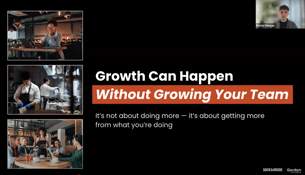You’ve opened your dream restaurant after years of planning, saving, and executing. The neighborhood embraced you, a group of steady regulars keep your bills paid, and the 4-point-something-star reviews on Google and Yelp suggest that you might be onto something here. Getting this first one off the ground was a bloody, tear-streaked triumph. But now you’re starting to wonder: Should you run it all back and open a second location?
In some ways, this can be a tougher choice than the decision to open your first place. After all, you were so innocent back then, so full of fire. If you knew then what you know now, would you still go through it? And now that you have a successful venture humming along, you have something to lose. What happens if that second location craters — will the flop drag down the first location? That said, what if you’re just scratching the surface with the one location — when you might have the ingredients of a nascent restaurant group? What-ifs also keep people up at night.
It’s a minefield to size up costs, efforts, location, and customer retention. So we reached out to a restaurant operator who knows how to make the fateful leap from one to two: Nick Pfannerstill, the chef and owner at Nobody Told Me on the Upper West Side of New York, and a partner in Mother’s Ruin, with locations in New York, Nashville, and Chicago. As we reached him, he was midstream in an expansion, just a few months away from opening a second location of Nobody Told Me, in Brooklyn. We talked to him about how he knew that now is the time.
Before we talk about a second place, let’s chat about your first. How did you know when it was time to make the transition from chef to owner?
I always knew I wanted to have my own restaurant. I’m very stubborn! I thought it would be a fun, creative expression to have something that’s all mine. (Although I found out it’s a giant collaboration.) There’s a roadmap for switching from chef to entrepreneur — it’s frowned on for people to start too young, because you don’t have the experience. And often, those fail. So I thought, let me reach the top as a chef until I’m comfortable and ready, which took about 15 years.
At Dovetail, my previous restaurant, there were wealthy patrons who took pride in what I was doing. A few of them wanted me to do something on my own, so I had financial backing. That’s when I knew it was time.
Why did you feel New York, and specifically the Upper West Side, was where you wanted to call home with Nobody Told Me?
They say if you can make it in New York you can make it anywhere! I thought, if I’m going to do this, why not do it in New York? Once you have a spot in New York, it propels opportunities elsewhere. And, really, I just love it here.
I swore I wasn’t going to do Upper West Side after being at Dovetail for five years — I really wanted to go downtown, with all the cool kids. But you have to think about economics and business savvy. My partner and his wife were living uptown, and he kept talking about how the younger crowd uptown had no cool bars to go to. So we looked. We saw like 80 different locations before we found the space for Nobody Told Me. But then we walked in the door and knew it was home.
What was it about the space that excited you? How did you know it was home?
Number one, physical location. Demographics are so important for us. We want to cast as wide a net as possible. There’s a college right there, which helps. But we get teachers, parents, and neighborhood regulars, too. We have the mentality that the space doesn’t matter as much as the right location and the right price. This was actually bigger than we thought we needed, but we got a great deal, and most importantly, there was an employee restroom, locker room, and prep kitchen downstairs. Having dealt with this my whole career, I knew those things make it so much nicer for the staff. I was sold.
Let’s talk about your second location. You have experience with an existing business (Mother’s Ruin) that has now opened in its third city. What lessons did that teach you going into your new location with Nobody Told Me?
The biggest things to think about when opening another location: You want to find somewhere that the demographic hits, the location has a demand, and the economics make sense.
With Nobody, we want to build a flagship in NYC. So we’re going to be in Dumbo. There are very few things to do down there, the space is beautiful, and the landlords really want us to be successful. They actually courted us for about a year before I said yes.
We’re going to prove that we have a great product and a great vision. If the new location does well, then it’s easier to raise more money for an even bigger business with a higher ceiling. In Dumbo we want to take it another step up. If all goes well, then we have a better roadmap about how to build a larger space elsewhere.
So I’m a restaurant owner and things are going well, but maybe I’m not flush with cash. What are the pros and cons I should weigh before opening a second location?
We don’t make any decisions without looking at data. You have to take emotion out of this.
There are a million things to consider. Demographics is number one. What are the income brackets? What do they spend? When are they in town to dine out — do they have summer homes and leave the city? Have the home prices grown?
You always have to find money. But it doesn’t take millions. You just have to be budget-minded. Ambition drives this stuff too. You’re going to make mistakes, but you have to take risks.
That’s why you look at 80 spots. And everyone goes through the same trial and error. It may take years — it took us two-and-a-half years to find our Upper West Side location. The reason we started looking early is we knew it would take forever to find it. We looked before we were ready. Patience is a major component.
How do you build an audience? How do you find your fans and bring people through the doors of the new place, especially if it’s in a different neighborhood or city?
Social media is very big, using targeted ads. I never go without PR. If you get a nod in New York magazine, or Eater Chicago, that stuff really matters. It’s hard to put a price on that. Six months of extra lift could be the difference in making or breaking a business.
What anxieties did you have around opening a new location?
Everything! My advice is to lay off the alcohol and caffeine and spend extra time at the gym. Before agreeing to a space, you have to run the math. A lot of restaurants fail. But if you’re smart about it, there are always levers to pull. If something is wrong, you can fix it.
Do you have a last piece of advice?
Research. And don’t stress the money. Most people feel like if they don't have someone handing them a million dollars they can’t do it. But do your research and have faith.
[Photo courtesy Nobody Told Me]





